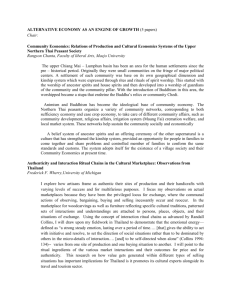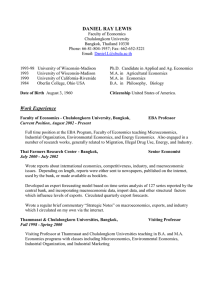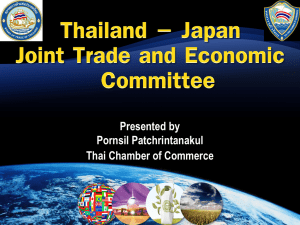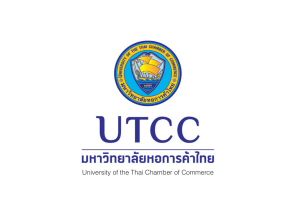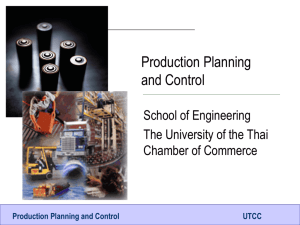UTCC Press Release - The Townsend Thai Project
advertisement
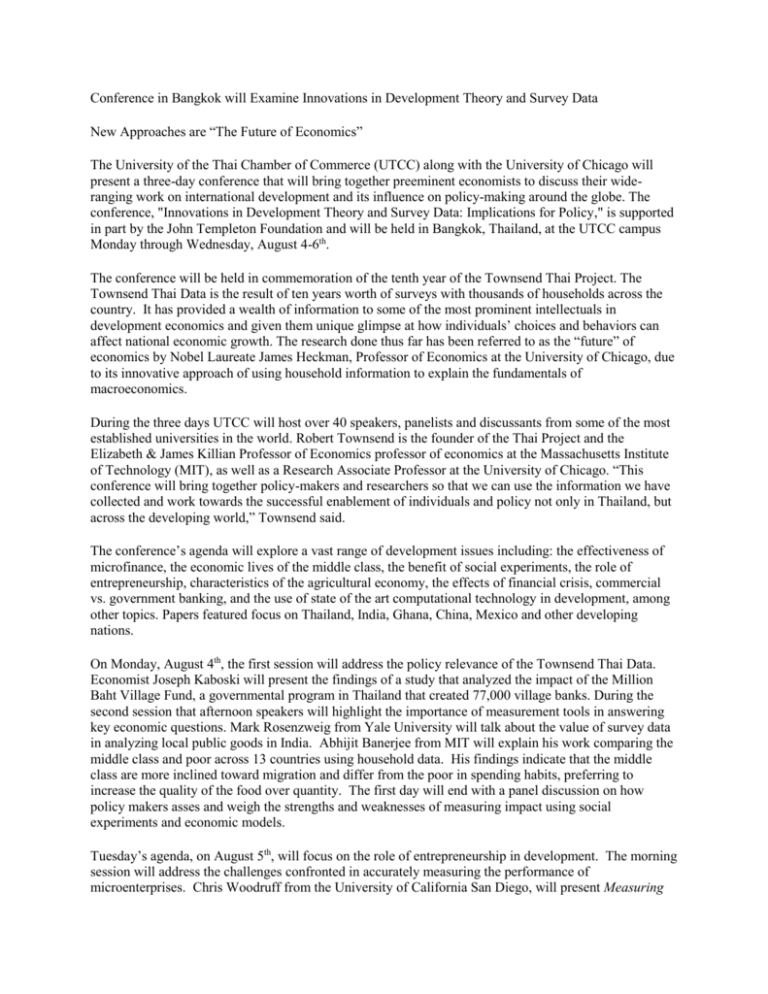
Conference in Bangkok will Examine Innovations in Development Theory and Survey Data New Approaches are “The Future of Economics” The University of the Thai Chamber of Commerce (UTCC) along with the University of Chicago will present a three-day conference that will bring together preeminent economists to discuss their wideranging work on international development and its influence on policy-making around the globe. The conference, "Innovations in Development Theory and Survey Data: Implications for Policy," is supported in part by the John Templeton Foundation and will be held in Bangkok, Thailand, at the UTCC campus Monday through Wednesday, August 4-6th. The conference will be held in commemoration of the tenth year of the Townsend Thai Project. The Townsend Thai Data is the result of ten years worth of surveys with thousands of households across the country. It has provided a wealth of information to some of the most prominent intellectuals in development economics and given them unique glimpse at how individuals’ choices and behaviors can affect national economic growth. The research done thus far has been referred to as the “future” of economics by Nobel Laureate James Heckman, Professor of Economics at the University of Chicago, due to its innovative approach of using household information to explain the fundamentals of macroeconomics. During the three days UTCC will host over 40 speakers, panelists and discussants from some of the most established universities in the world. Robert Townsend is the founder of the Thai Project and the Elizabeth & James Killian Professor of Economics professor of economics at the Massachusetts Institute of Technology (MIT), as well as a Research Associate Professor at the University of Chicago. “This conference will bring together policy-makers and researchers so that we can use the information we have collected and work towards the successful enablement of individuals and policy not only in Thailand, but across the developing world,” Townsend said. The conference’s agenda will explore a vast range of development issues including: the effectiveness of microfinance, the economic lives of the middle class, the benefit of social experiments, the role of entrepreneurship, characteristics of the agricultural economy, the effects of financial crisis, commercial vs. government banking, and the use of state of the art computational technology in development, among other topics. Papers featured focus on Thailand, India, Ghana, China, Mexico and other developing nations. On Monday, August 4th, the first session will address the policy relevance of the Townsend Thai Data. Economist Joseph Kaboski will present the findings of a study that analyzed the impact of the Million Baht Village Fund, a governmental program in Thailand that created 77,000 village banks. During the second session that afternoon speakers will highlight the importance of measurement tools in answering key economic questions. Mark Rosenzweig from Yale University will talk about the value of survey data in analyzing local public goods in India. Abhijit Banerjee from MIT will explain his work comparing the middle class and poor across 13 countries using household data. His findings indicate that the middle class are more inclined toward migration and differ from the poor in spending habits, preferring to increase the quality of the food over quantity. The first day will end with a panel discussion on how policy makers asses and weigh the strengths and weaknesses of measuring impact using social experiments and economic models. Tuesday’s agenda, on August 5th, will focus on the role of entrepreneurship in development. The morning session will address the challenges confronted in accurately measuring the performance of microenterprises. Chris Woodruff from the University of California San Diego, will present Measuring Microenterprise Profits: Must We Ask How the Sausage is Made?, a paper that has shed light on the recurrent accountability problem of microenterprises underestimating their own financial performance. Chris Udry from Yale University will talk about evidence on the Organization of Economic Activity in Ghana. Additionally, Anan Pawasutipaisit will present a paper that attempts to uncover the factors that contribute to the success of entrepreneurs. In the mid-morning and afternoon, two sessions will examine the role of economic modeling in explaining entrepreneurship and look at questions such as—Is entrepreneurship an engine for development? What’s the driving force to become an entrepreneur? What enabling environment does entrepreneurship need to flourish? What are the risks the entrepreneur faces? During the 6th session on Wednesday morning, the speakers will bring together sub-disciplines in economics to place policy and practice in its broader context. Three works that use general equilibrium models will discuss the interplay of microeconomic circumstances with macroeconomic performance. In the evening, the 8th session will feature the use of state of the art technological and computational tools in research and the policy analysis. Innovations related to computational economics, geographic information systems (GIS), and statistical analysis will demonstrate the future of economic analysis and the potential for blending research and policy. The final panel discussion will bring together policymakers from the Federal Reserve Bank, the International Monetary Fund and local Thai agencies to discuss the future for using research in policy making. More information about the conference, including a full list of participants and the work that will be presented, can be found at http://cier.uchicago.edu/conference.
